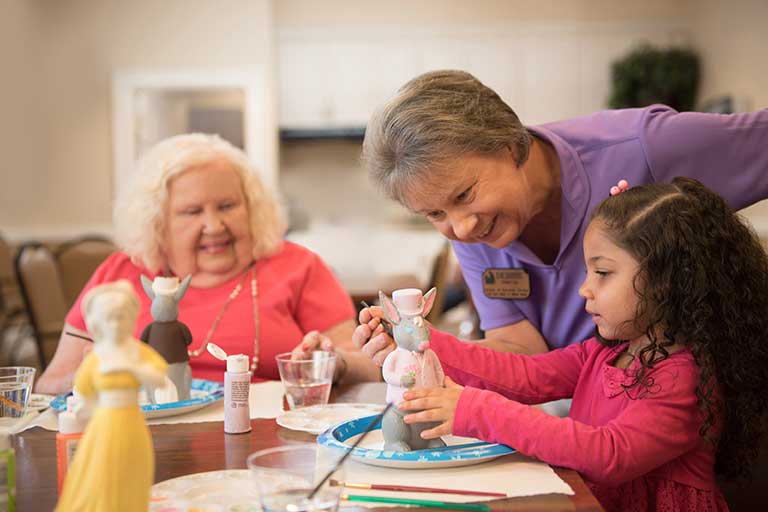

When preparing to visit a loved one, follow any visitation hours or guidelines the facility may have established. You should also plan a short initial visit to assess how much time your loved one can spend comfortably with company (some treatments, medications or medical conditions can leave him or her easily tired). When you are ready to plan a visit, call your loved one before you arrive. Arrange a time that is convenient for him or her that does not interfere with scheduled medical care. If your visit is around a meal or activity time, consider asking if you may join in. Should you need to, bring a supportive friend or child that the resident or patient knows (be certain younger visitors know what to expect).
Upon arrival at the facility, there are a variety of sights, sounds and smells that may be unfamiliar, intimidating or discomforting. You will see people in wheelchairs, people using walkers and people lying in bed. Some will be happy and talkative; others may be in pain, sleeping or unable to respond to you. There will be medical equipment, feeding and oxygen tubes, nurses, dietitians, doctors and other family members visiting other residents and patients. Smells such as cleaning solutions, food, beauty salon chemicals and possibly even unpleasant body odors may be encountered. Finally, there may be sounds of alarms, equipment beeping, telephones, conversations and laughter, crying and shouting, and music and television.
When you reach your loved one's room, knock on his or her door and ask permission to enter - remember, this room is his or her home while at the facility. Once you enter, it's important to reassure your loved one with touch. Give him or her a hug, a pat on the hand or a kiss on the cheek. You may want to eliminate distractions by closing the door or turn off the television when you first arrive. Treat your loved one with respect and not like a child, acting calm and stress-free. If you are anxious or uncomfortable, your loved one will be able to tell, and it may affect his or her mood.

Initiating conversation with your loved one may be more difficult in the unfamiliar environment of a care center. There are some easy conversation ideas you can use to begin your visit. For example, you can provide meaningful or anecdotal information about a family member or a friend who lives out of town. Ask your loved one questions about the food, activities or other residents. You could ask your loved one for advice on a situation or about a hobby he or she may have expertise in, such as gardening or cooking. You might talk about your own family, job or goals and include your loved one in the conversation by relating certain things to his or her life or by asking questions. You may also relive the past by talking about weddings, jobs, school, most embarrassing moments or family history. If conversation still proves difficult, you could ask the facility's activities director for a daily schedule and join your loved one for a class or game.
Your loved one will appreciate you dropping by for short visits, as well as staying for longer visits. Regardless of the length of your stay, there are a variety of ways to spend time with your loved one:

You can enhance your loved one's life by getting to know his or her caregivers. Just as there is an adjustment period for your loved one, the nurses, doctors, staff members and volunteers at the facility have to get to know and become comfortable with your loved one as well. Working in a care facility can be challenging, but the support shown to staff by the families of patients and residents can foster growth in the lives of everyone involved.
In order to make the transition easier for both your loved one and the staff, there are several simple things you can do. Provide staff with a photograph and short biography of your loved one that includes information such as likes and dislikes, hobbies, practiced religion and personality traits. Take a few minutes to exchange small talk with the staff members each visit, paying particular attention to those who are assigned to interact with your loved one. Learn their interests and ask about their families.
If you are leaving town or if someone else will be visiting your loved one, let the staff know. Don't be afraid to privately ask the staff members questions about your loved one or for advice on how to handle situations concerning your loved one's care. Speak with the activities director and find out if there is an activity your loved one enjoys that you could volunteer to help with. This will even help you if your loved one has made friends or has a roommate, as it will allow you an opportunity to get to know them.
Life Care operates or manages more than 200 skilled nursing, rehabilitation, Alzheimer's and senior living campuses in 27 states.
Find a Location